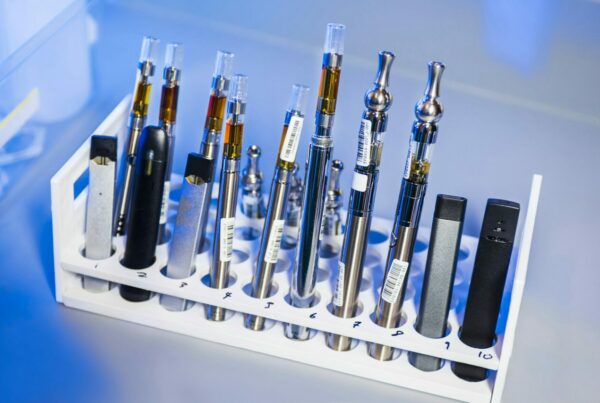N, N-Dimethyltryptamine (DMT) is a compound commonly found in both plants and animals. It’s known for inducing potent yet short-lived psychedelic effects when ingested.
Emerging evidence suggests that DMT, which occurs naturally within the body, plays crucial roles in both the peripheral and central nervous systems. It may even function as a neurotransmitter.
DMT can provoke strong psychedelic sensations, but it usually doesn’t cause many adverse effects. However, potential cardiovascular problems may occur if large doses are administered via injection.
Let’s explore DMT and its diverse roles, ranging from recreational usage to its promising potential for scientific research and therapeutic uses.

A Brief Introduction to DMT: What is it?
| Feature | Description |
| Name | N, N-Dimethyltryptamine (DMT) |
| Classification | Indole alkaloid |
| Occurrence | Naturally found in various plants and animals |
| Psychoactive Effects | Provokes brief, intense psychedelic experiences when ingested. |
| Method of Consumption | Can be smoked, injected, or taken orally. |
| Duration of Effects | Short duration, typically lasting from 5 to 30 minutes. |
| Chemical Structure | Comprises a tryptamine core with two methyl groups attached to the nitrogen atom of the amine group. |
| Metabolism | Rapidly metabolized by the body, broken down by monoamine oxidase (MAO). |
| Cultural Use | Historically used in ceremonials and shamanic rituals by indigenous cultures. |
| Other names | Dimitrifantasia, businessman’s trip, Businessman’s special, 45-minute psychosis, spiritual molecule |
The Role of DMT in Mental Health
N, N-Dimethyltryptamine (DMT), a compound famous for its powerful psychedelic effects, is gaining attention for its potential benefits to mental health. Despite its conventional image as a trigger for intense visionary experiences, recent research suggests a connection between DMT and mental health improvement.
Influence on Psychological and Emotional Enhancing Wellness
DMT’s psychedelic effects are recognized for eliciting deep emotional reactions and altering states of consciousness. These characteristics could potentially pave the way for therapeutic interventions to address mental health problems, assist in emotional processing, and generate new understanding of personal traumas.
Influence on Neuroplasticity and Brain Function
Research suggests DMT may influence neuroplasticity, thereby enhancing the brain’s ability to adapt and reorganize itself. Investigating its impact on synaptic plasticity and neural connectivity may provide potential treatments for conditions stemming from neural imbalance.
Potential Therapeutic Application for Mental Health Conditions
Early studies underscore DMT’s potential in treating disorders such as depression, addiction, and PTSD. Its ability to induce mystical or spiritual experiences could offer a distinctive method in psychotherapy and aid in restructuring negative thought processes.
Probing into the natural presence of DMT within the body indicates its relevance in mental health resilience, stress response, and overall psychological well-being. Understanding how the body controls internal DMT levels may lead to novel therapeutic strategies.
DMT’s Role in Mental Health Disorders
| Mental Health Disorder | Description | Effectiveness of DMT | Advantages |
| Depression | Defined as a mood disorder marked by persistent sadness, loss of interest, and decreased motivation | Preliminary studies suggest DMT could alleviate symptoms by inducing deeply emotional experiences. | Its rapid onset and capacity to prompt transformative experiences may offer innovative therapeutic approaches for restructuring negative thought patterns and enhancing emotional processing |
| Post-Traumatic Stress Disorder (PTSD) | A mental health condition triggered by traumatic incidents resulting in flashbacks, extreme anxiety, and intrusive thoughts | Initial research indicates DMT’s potential to manage symptoms by inducing spiritual or mystical experiences that could help patients reshape traumatic memories | DMT’s capacity to induce altered states of consciousness may assist in facilitating emotional processing and offering a fresh perspective on traumatic experiences |
| Addiction | A complex disorder characterized by compulsive participation in rewarding stimuli, despite adverse consequences | Some research indicates DMT’s potential role in interrupting addictive patterns and reducing substance cravings | DMT’s ability to induce intense and transformative experiences might aid individuals in modifying their behavioural patterns and addressing underlying factors of their addiction |
Approaches to Using DMT
DMT, noted for its capacity to provoke short yet powerful psychedelic experiences, can be utilized in a variety of methods. The chosen mode of administration often relies on the desired intensity and length of the trip.
Smoking:
DMT, when smoked in a pipe or vaporized, necessitates careful control of temperature to avoid overheating and scorching the compound. The psychedelic journey commences almost instantly when DMT is smoked, generally lasting from 5 to 15 minutes.
Oral Intake:
Taking DMT orally triggers slower but longer-lasting effects, frequently spanning several hours, due to the slower degradation of DMT when paired with an MAOI.
Injection:
DMT can be directly injected into the bloodstream for rapid and potent effects.
This approach results in a swift and powerful experience, but it demands precise dosage and carries greater risks.
Insufflation (Snorting):
Inhaling DMT results in a slower onset of effects compared to smoking but potentially provides a more extended experience.
Sublingual or Buccal Administration:
When absorbed via the oral mucosa, this method provides an alternative to smoking and affords a longer, though less intense, trip.
Determining Therapeutic Dosage: N, N-Dimethyltryptamine (DMT)
For smoking, the suggested dosage lies between 20 to 40 mg, while for intravenous usage, it is recommended to have 0.2 to 0.4 mg per kg of body weight. These dosage guidelines are primarily applicable to clinical research and are particularly significant for intravenous administration.
- Increased intravenous doses are associated with vivid visuals, temporary loss of control, and a combined state of unease and exhilaration
- Intriguingly, lower doses have exhibited less favorable effects
- Recreational doses of smoked DMT typically vary from 40 to 50 mg, sometimes even escalating to 100 mg
- Various doses of intravenous People have reported positive and sustained enhancements in their psychological well-being after experiencing near-death situations associated with DMT in doses of 7, 14, 18, and 20 mg solutions.
Availability of DMT
ProductsOsmosis – 4-ACO-DMT Ethereal Essence Tincture
This tincture is marketed to contain 4-Acetoxy-N, N-dimethyltryptamine (4-AcO-DMT), a type of DMT. Tinctures, which are liquid extracts intended for oral usage, offer a distinct experience compared to traditional DMT with this particular product.
Lucid Supply Co. – 5-MeO DMT Vaporizer
This product is a vaporizer that delivers 5-Methoxy-N, N-dimethyltryptamine (5-MeO-DMT). The active ingredient, 5-MeO-DMT, is famed for its intense, transformative, and often transient experiences.
Integral Alchemist – Acacia – 1ml DMT Vape Cartridge
The DMT vape cartridge by Integral Alchemist comes pre-loaded with N, N-Dimethyltryptamine. This product is likely designed for those who favor a discreet and convenient way to consume DMT.
Deadhead Chemist – 5-Meo-DMT Cartridge
This cartridge houses 5-Methoxy-N, N-dimethyltryptamine (5-MeO-DMT), a substance known for delivering intense and deep experiences.
There may be potential mental health benefits related to personal growth, spiritual experiences, or therapeutic applications aimed at enhancing emotional health.
Deadhead Chemist – N, N DMT Cartridge
This is another product from Deadhead Chemist, a cartridge containing the classic N, N-Dimethyltryptamine. Cartridges provide a user-friendly way to ingest DMT, ensuring a more controlled and stable experience.
Concluding Remarks
The application of N, N-Dimethyltryptamine (DMT) in
How to ensure safe and responsible use of DMT?
The key to safe and responsible use of DMT lies in understanding its effects, being aware of personal tolerance levels, and ensuring a supportive environment for the experience.
It’s also crucial to seek advice from mental health professionals or experienced users to gain insights into potential risks and benefits.
Conducting a thorough research and making informed decisions can significantly contribute to a positive and beneficial DMT experience.
Mental health therapy offers an exciting but complex journey. The ability of certain compounds to induce intense, yet brief, psychedelic experiences opens up new avenues for therapeutic approaches.
Early studies indicate a potential role in emotional processing, personal development, and possibly
Given the significant impact of mental health treatment, it requires careful consideration and responsible usage.
If you’re considering exploring DMT products in a responsible manner, reliable sources such as Mushrooms Online Canada Online Dispensary can provide guidance and a variety of options.
Frequently Asked Questions:
How do various DMT products affect mental health differently?
For instance, vaporizers may yield immediate effects, while tinctures or vape cartridges can provide more controlled and consistent doses.
Introducing derivative compounds or 5-MeO-DMT can result in varying levels of intensity and diverse effects on mental health.
These subtle variations underscore the importance of selecting a DMT product based on individual needs and mental health goals.
Can DMT induce long-term changes in mental health and personal growth?
Anecdotal evidence suggests that DMT-induced experiences can have enduring effects on mental health and personal evolution.
Deeply profound or transformative experiences, such as those akin to near-death experiences, are often associated with reports of continuous positive changes in psychological health and personal development.
Despite these experiences being intense and transitory, they frequently lead to introspection, spiritual revelations, and a sense of unity or enlightenment.
Users often report a refreshed perspective on life, enhanced emotional resilience, and a heightened appreciation for life following these experiences.
What is the optimal strategy for using DMT for mental health purposes?
It’s essential to make informed decisions, which requires thorough research and understanding of the compound’s effects.
Advice from mental health professionals or experienced users can provide valuable perspectives on potential risks and benefits.
Recognizing personal tolerance and mental preparedness is also vital, along with ensuring a supportive and safe environment for the experience.
How does DMT stack up against other psychedelic therapies such as psilocybin or LSD in the context of mental health treatment?
DMT’s impact, period of effect, and intensity are distinct from other psychedelics like psilocybin or LSD. It’s known for its short duration.
High-intensity, short-acting psychedelics like DMT bring about unique experiences that necessitate specific therapeutic approaches in mental health. These approaches are different from those used for psychedelics with longer-lasting effects.
Recommended Additional Reading:





